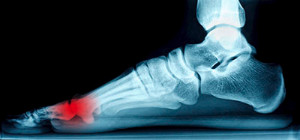
 The medical condition that is referred to as sesamoiditis develops as a result of inflamed tendons surrounding the sesamoid bones. These small bones are located under the ball of the foot, and help to move the big toe. An injury may cause the sesamoid bones and surrounding area to become damaged, and the patient may feel pain and discomfort on the sole of the foot while walking and running. Additionally, this condition may develop from wearing shoes that have inadequate room for the toes to move freely in. Mild relief may be found when the affected foot is frequently rested, and it generally helps to wear shoes that fit correctly. If you are experiencing these types of symptoms, it is strongly suggested that you schedule a consultation with a podiatrist who can properly diagnose and treat this condition.
The medical condition that is referred to as sesamoiditis develops as a result of inflamed tendons surrounding the sesamoid bones. These small bones are located under the ball of the foot, and help to move the big toe. An injury may cause the sesamoid bones and surrounding area to become damaged, and the patient may feel pain and discomfort on the sole of the foot while walking and running. Additionally, this condition may develop from wearing shoes that have inadequate room for the toes to move freely in. Mild relief may be found when the affected foot is frequently rested, and it generally helps to wear shoes that fit correctly. If you are experiencing these types of symptoms, it is strongly suggested that you schedule a consultation with a podiatrist who can properly diagnose and treat this condition.
Sesamoiditis is an unpleasant foot condition characterized by pain in the balls of the feet. If you think you’re struggling with sesamoiditis, contact Dr. Alan J. Spector of Shore Podiatry. Our doctor will treat your condition thoroughly and effectively.
Sesamoiditis
Sesamoiditis is a condition of the foot that affects the ball of the foot. It is more common in younger people than it is in older people. It can also occur with people who have begun a new exercise program, since their bodies are adjusting to the new physical regimen. Pain may also be caused by the inflammation of tendons surrounding the bones. It is important to seek treatment in its early stages because if you ignore the pain, this condition can lead to more serious problems such as severe irritation and bone fractures.
Causes of Sesamoiditis
Treatment for sesamoiditis is non-invasive and simple. Doctors may recommend a strict rest period where the patient forgoes most physical activity. This will help give the patient time to heal their feet through limited activity. For serious cases, it is best to speak with your doctor to determine a treatment option that will help your specific needs.
If you have any questions please feel free to contact our office located in Point Pleasant, NJ . We offer the newest diagnostic and treatment technologies for all your foot and ankle needs.